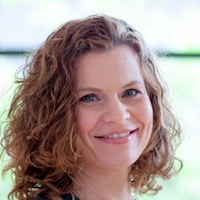I remember the moment my relationship with Judaism shifted into something deeply meaningful.
I was in my late 20s and had returned from my guru’s ashram in India, where I was living, for a family visit. It was the High Holy Days, and I attended synagogue with my parents. We were singing “Adon Olam,” “The Lord of the Eternal,” a beautiful hymn to the glory of the divine written in the 11th century.
Though I had recited this prayer hundreds of times before, this time it felt completely new. I actually felt something as I was singing. It was an expansive, powerful, and loving inner presence. Like finally biting into an apple after hearing countless descriptions of what it tastes like, I was experiencing what the song describes—the majesty and magnificence of the One—inside. And, simultaneously, I felt love and devotion to that presence.
Reflecting on my Jewish upbringing, one thing stands out: In all my years of studying Jewish law, participating in customs and rituals, and singing prayers to the heavens, I can’t recall ever actually feeling anything inside. While I now know there is a beautiful, rich, and deeply sacred mystical tradition in Judaism, this wasn‘t something I learned about growing up.
I was raised in a conservative Jewish family on Long Island, New York. I attended Jewish day school from ages 7 until 13. It’s been over three decades since my Bat Mitzvah. Although I can vividly recall the magenta taffeta dress I wore, the colour of the tablecloths, and the font used on my invitations, I remember nothing about the scriptural text I recited that day.
I realize this is about culture, not religion. I have an Israeli friend who describes her very devotional upbringing, where heartfelt chanting and dancing were part of daily life. But my education was centered on traditions, values, and behaviors, rather than the internal experience that gives meaning and substance to those observances. I learned what it meant to live as a Jew in the world, rather than Judaism as a spiritual path. In short, I learned how to be Jewish on the outside, not on the inside. For a long time, being Jewish remained a socio-cultural identity for me. It was certainly important, but not transformative.
At 23, I began practicing yoga in the forms of meditation, chanting, the study of sacred texts, selfless service, and asana. I discovered my inner being through these practices. Even more importantly, yoga taught me that the deepest sense of myself that was unveiled in meditation was the divine. This felt true and beyond any one religion or outer form. And yet, my experiences of self-discovery through yoga and meditation felt worlds apart from my education and incongruent with my Jewish identity. That is, until that day in synagogue.
Yoga led me to the experience that the divine I had been singing to all those years was actually already alive within me. This is what allowed me to get inside the experience of that prayer that day.
In yoga, this devotional inner feeling is called bhakti. In synagogue that day, “Adon Olam” became a way of glorifying an authentic and meaningful inner feeling of love that was grounded in my experience. I sang the rest of the song like I meant it, expressing the sweetness and power of my inner feeling through the words.
In yoga and meditation, we gain access to the experience of our most essential selves. This state is at once universal and yet multi-faceted in the ways it might show up for us. It might feel like an abiding, unadorned sense of presence, a peace that lies just beneath the surface of our ordinary awareness, or a sweet and loving inner feeling.
Yoga as a devotional practice leads us toward an experience of the unadorned, the singular sanctity at the heart of every religion. This is a universal experience, free from the constructs of tradition and outer ritual, and far from the cultural or societal expectations that being raised in one religion might place on us.
The inner connection we nurture through yoga and meditation allows us to rediscover the tradition we grew up with through the lens of a direct experience gleaned from our practices. This experiential knowing carries meaning, power, and potency.
In taking a fresh look at what might have once been prescribed, we uncover the power at the source of all sacred traditions. We come to recognize and affirm ecumenical values from a place of deep and integrated knowing. It’s this inner experience that can fuel our desire to become kinder, more generous and compassionate people, to share our gifts with the world as service, and to live as responsible human beings. Perhaps most importantly, it allows us to reconcile, reclaim, and honour our ancestry as an integral part of who we are.
The experience of yoga now gives substance to my Jewish identity. Meditation opened the doorway to the divine within me, the glory of God in the form and being of my person. Having this experience, I can’t help but want to share it as who I am and in the kind of life I lead.
Indeed, the truth is one, and the paths to it are many.
~
~
~
Author: Barrie Risman
Image: Author’s Own, Pixabay
Editor: Travis May

 Share on bsky
Share on bsky







Read 1 comment and reply